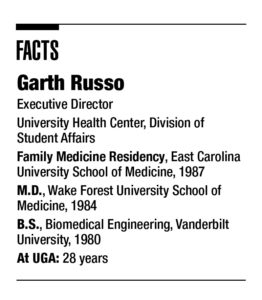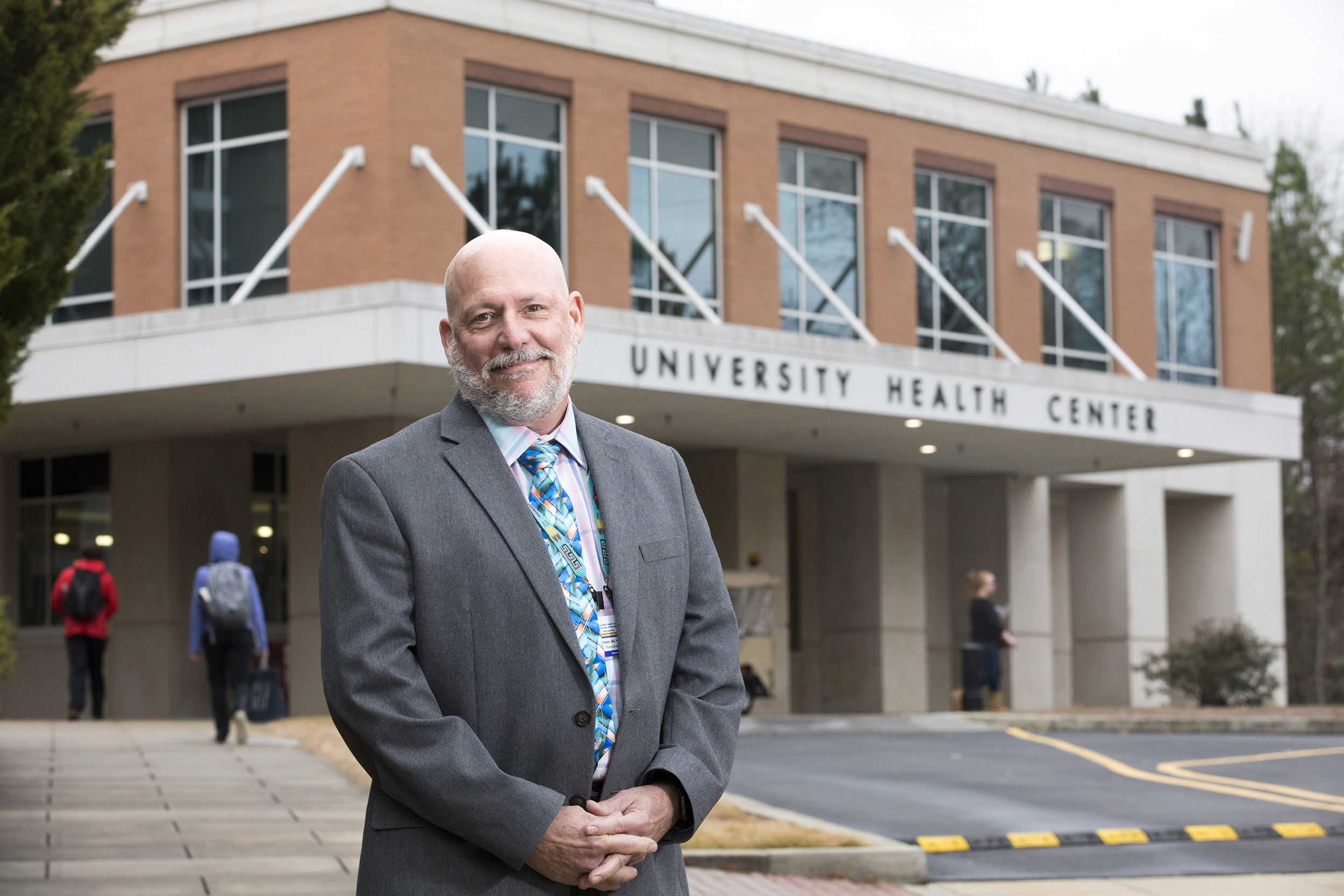 (Originally published Jan. 30, 2020)
(Originally published Jan. 30, 2020)
Garth Russo no longer treats patients in his position as executive director of the University Health Center, but they’re at the center of everything he does.
“There is nothing more special than someone sharing their life with you,” he said. “There are few professions left like this one where people come to you and have to be open and share—that’s where healing starts.”
Russo studied biomedical engineering and conducted heart research in college. He decided that primary care was his true calling and went to medical school.
As an outdoors person, he was intrigued by expedition or wilderness medicine—the practice of medicine where definitive care is more than one hour away. While at Wake Forest School of Medicine, he found a way to incorporate the decision-making and creative thinking skills needed for the difficult patient access, limited equipment and sometimes environmental extremes of expedition medicine with primary care. He received a National Service Corps scholarship to pay for medical school. The arrangements were that recipients would then go to a rural area and work in primary care. One year of school was paid for by one year of service after graduation.
Russo met his wife, Natalie Blatchford, while they were both in medical school. They married a week before they graduated so that she could have his last name on her diploma, saying that hers was too long. They looked for an area in the Appalachians where she could practice and he could fulfill his service requirement. They started looking in northern West Virginia before making their way down to the Clemson, South Carolina, area, where Russo grew up, and then moving to northeast Georgia where each joined a different clinic of the three that comprised the Northeast Georgia Family Medical Centers. The medical director for those clinics was also on staff at UGA’s University Health Center, and Natalie took a position at the UHC in 1988 (and retired two years ago) with Garth following in 1991 after his service period.
His career at the UHC began as a staff physician. But he also put his engineering skills to use, saying he’s a tinkerer and sees things from a systems perspective. He eagerly took part in gathering data and making plans to move the UHC from a mostly walk in model to the more appointed, primary care model present today. He’s become a specialist in clinical informatics and led the shift to electronic records. Before his current position, he also served as medical director.
“There is something really special about caring for students who are in a developmental stage,” Russo said. “We witness them learn to make decisions about themselves as they become more health literate while they are under our care.”
UGA students are assigned a color-coded team and a primary provider. That’s important, Russo said, because it allows the physicians and patients to not only develop a relationship, but also a more well-rounded look at their health. In essence, Russo envisions a wellness network with an even wider range of services, where behavioral health concerns and medical concerns can be addressed cohesively.
“What drives the bulk of our decisions is making sure UGA students have the best care that they can possibly have,” he said. “That’s our primary mission.”
Russo also has the opportunity to interact with many UGA students through the UHC’s seven student groups, like the Student Health Advisory Committee, the Healthy Dawgs Ambassadors and Be Well Peer Educators. That peer-to-peer sharing of information is important, according to Russo.
“Empowering them to participate in their care and ask questions if they don’t understand something—that’s our investment in the future of health care,” he said.
The UHC celebrated its 100th anniversary in 2018, and moving forward, Russo hopes to build the best internal structure possible for its future.
“We see a lot that could be better, and our commitment is to make that happen,” he said.
Russo also has the opportunity to interact with many UGA students through the UHC’s seven student groups, like the Student Health Advisory Committee, the Healthy Dawgs Ambassadors and Be Well Peer Educators. That peer-to-peer sharing of information is important, according to Russo.
“Empowering them to participate in their care and ask questions if they don’t understand something—that’s our investment in the future of health care,” he said.
The UHC celebrated its 100th anniversary in 2018, and moving forward, Russo hopes to build the best internal structure possible for its future.
“We see a lot that could be better, and our commitment is to make that happen,” he said.


